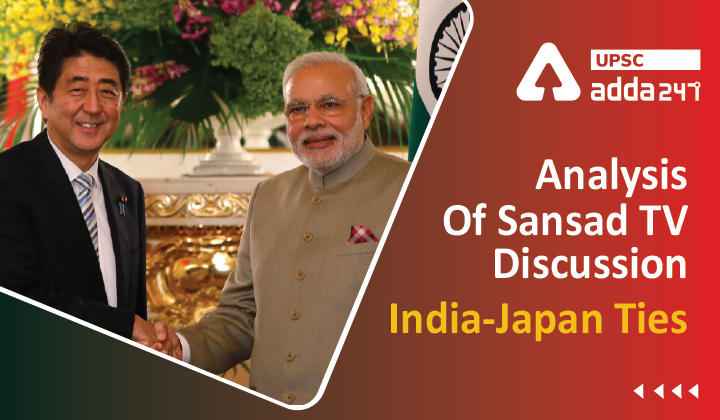Table of Contents
Analysis Of Sansad TV Discussion: ”India-Japan Ties”
Relevance
GS 2: Groupings & Agreements Involving India and/or Affecting India’s Interests, Effect of Policies & Politics of Countries on India’s Interests
Introduction
- The India-Japan bilateral summit meeting will be held on 19th March 2022.
- In fact, the year 2022 also marks seven decades of diplomatic relations between both nations.
- Japanese PM Fumio Kishida and Prime Minister Narendra Modi will hold talks to further strengthen the bilateral ties.
- Japan and India are expected to enhance economic cooperation and share assessments on the crisis in Ukraine and Indo-Pacific as well.
History Of India-Japan Relations?
- The friendship between India and Japan has a long history rooted in spiritual affinity and strong cultural and civilization ties.
- The exchange between Japan and India is said to have begun in the 6th century when Buddhism was introduced to Japan.
- Indian culture, filtered through Buddhism, has had a great impact on Japanese culture, and this is the source of the Japanese people’s sense of closeness to India.
- Japan and India signed a peace treaty and established diplomatic relations on 28th April 1952. This treaty was one of the first peace treaties Japan signed after World War II.
- Ever since the establishment of diplomatic relations, the two countries have enjoyed cordial relations.
- In the post World War II period, India’s iron ore helped a great deal Japan’s recovery from the devastation.
What are the key expectations from the meeting?
- The key challenges in front of both the countries are: How both countries can protect the rules-based international order? Looking towards a post-Covid-19 world, how can both countries build resilient supply chains and reinvigorate the economy? How can both countries reform international organisations to match the realities of a rapidly changing world? How can both countries respond to new international challenges like cybersecurity and climate change?
- Both will discuss and analyse various aspects of this bilateral relationship and key focus areas of the forthcoming bilateral summit.
What was discussed in recent QUAD?
- In the recent Japan-Australia-India-US (Quad) Leaders’ Video Conference, in which PM Modi and PM Fumio Kishida participated, concurred that any attempt to unilaterally change the status quo by force, such as this time, must not be tolerated in the Indo-Pacific region, and that it is precisely because of this situation that it is critical to further promote efforts toward the realisation of a “Free and Open Indo-Pacific”.
Modi and Timeline of India-Japan Ties
- In September 2014, Prime Minister Narendra Modi paid an official visit to Japan and had a summit meeting with Prime Minister Shinzo Abe. They concurred to upgrade the bilateral relationship to “Special Strategic and Global Partnership.”
- In December 2015, Prime Minister Abe paid an official visit to India and had a summit meeting with Prime Minister Narendra Modi. They announced “Japan and India Vision 2025 Special Strategic and Global Partnership Working Together for Peace and Prosperity of the Indo-Pacific Region and the World”, a joint statement that would serve as a guidepost for the “new era in Japan-India relations.”
- In November 2016, Prime Minister Modi paid an official visit to Japan and had a summit meeting with Prime Minister Abe.
- In the Japan-India Vision Statement issued during Prime Minister Modi’s visit to Japan in October 2018, two leaders reiterated their unwavering commitment to working together towards a “Free and Open Indo-Pacific”.
- In September 2021, Prime Minister Suga, who was visiting Washington D.C. for the Second Japan-Australia-India-U.S. Summit Meeting, held a summit meeting with Prime Minister Modi.
- In October 2021, Prime Minister Kishida held a summit telephone talk with Prime Minister Modi, soon after Prime Minister Kishida’s taking office.
- The two leaders concurred to further develop Japan-India relations and work closely toward the realisation of a “Free and Open Indo-Pacific”.
Conclusion
PM Fumio Kishida’s visit to India will open a new chapter in bilateral relations that will deepen the “Japan-India Special Strategic, and Global Partnership”.



 TSPSC Group 1 Question Paper 2024, Downl...
TSPSC Group 1 Question Paper 2024, Downl...
 TSPSC Group 1 Answer key 2024 Out, Downl...
TSPSC Group 1 Answer key 2024 Out, Downl...
 UPSC Prelims 2024 Question Paper, Downlo...
UPSC Prelims 2024 Question Paper, Downlo...




